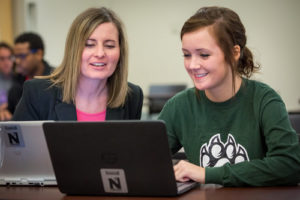A report from Complete College America reveals that only 19 percent of students attending public colleges full-time earn a bachelor’s degree in four years. A new initiative at Northwest Missouri State University (Northwest) is aggressively working to reverse that trend.
Launched in fall 2018, Complete 30 is a school-wide effort to help students graduate on time and is loosely based on Complete College America’s 15 to Finish program. Students strive to complete 30 credit hours every academic year, spanning fall, spring, and summer sessions.
“All of our students are encouraged to participate, but we also understand that the academic journey for each student is different,” says Allison Hoffmann, director, academic success and retention at Northwest. “We take a very personalized approach to student success and the same can be said for participation in Complete 30.”
Flexibility is built into Complete 30, allowing students to progress at their own pace. For example, one student could complete 15 credits per semester, while another student might accumulate 15 credits in the fall, but only 12 in the spring. Rather than let students fall behind and possibly lose their momentum, academic advisors would steer the student to pick up the additional three credits over the summer.
Equidistant from Des Moines, Omaha, and Kansas City, Northwest attracts a lot of students from rural communities, including many first-generation college students. Some may have to interrupt their schooling or be unable to take a full course load to help out on the family farm or care for a family member, so the involvement of academic advisors is key.
Advisors meet with students at least once per term, and sometimes more. They invest time and effort in getting to know students and working with them to come up with a personalized success plan that may need to be adjusted over time to meet students’ changing circumstances and keep them on track to graduate.
“These are great conversations for advisors to have with students: What are you able to do and manage? What do we need to factor in?” Hoffmann says. “If a student isn’t likely to meet that goal or is falling behind, then that’s when some additional conversation can take place to revise that academic plan.”
Discussions address the student’s situation, but Hoffmann is quick to point out that the tone is cordial, candid, and supportive. Students are not meant to feel that they’ve failed because they accrued fewer than 15 hours in a term and have sabotaged their chances for graduating. Instead, solutions are found that fulfill Northwest’s mission of “student success—every student, every day.”
Hoffmann says that there are three crucial benefits for students who graduate on time:
- saving money on tuition
- moving quicker into careers. “The average entry-level income for a bachelor’s degree in Missouri is just under $46,000. We’re always trying to help students understand the importance of a college education and a bachelor’s degree.”
- developing strong, lasting relationships that can serve students not only during their academic career, but also as they move out into the workforce
For institutions thinking about their own student success programs, Hoffmann offers these suggestions:
- Build relationships. Get to know your students and give them a good foundation to start their education.
- Be positive. Don’t let minor setbacks such as fewer completed credits derail their enthusiasm.
- Work to students’ needs. Come up with a program that students can realistically achieve and make adjustments when necessary.
Although Complete 30 was just launched and results aren’t in, the promise of success bodes well. Hoffmann says that students who complete 30 or more hours during their first year have a higher GPA than students taking fewer credits and have significantly higher graduation rates.

